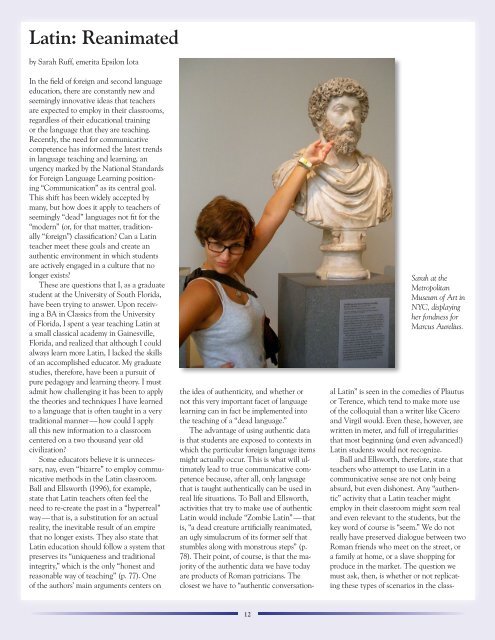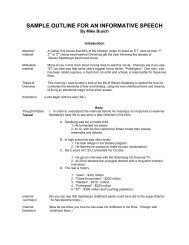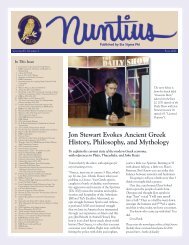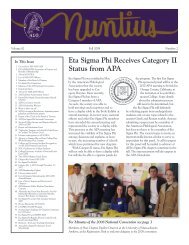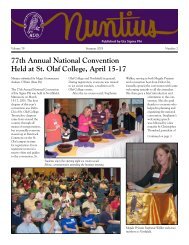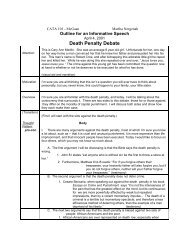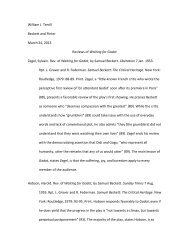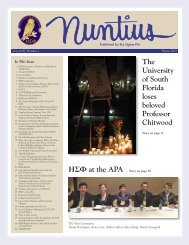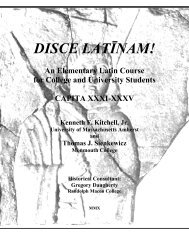In the Land of the Sibyl - Monmouth College
In the Land of the Sibyl - Monmouth College
In the Land of the Sibyl - Monmouth College
You also want an ePaper? Increase the reach of your titles
YUMPU automatically turns print PDFs into web optimized ePapers that Google loves.
Latin: Reanimated<br />
<strong>the</strong> idea <strong>of</strong> au<strong>the</strong>nticity, and whe<strong>the</strong>r or<br />
not this very important facet <strong>of</strong> language<br />
learning can in fact be implemented into<br />
<strong>the</strong> teaching <strong>of</strong> a “dead language.”<br />
The advantage <strong>of</strong> using au<strong>the</strong>ntic data<br />
is that students are exposed to contexts in<br />
which <strong>the</strong> particular foreign language items<br />
might actually occur. This is what will ultimately<br />
lead to true communicative competence<br />
because, after all, only language<br />
that is taught au<strong>the</strong>ntically can be used in<br />
real life situations. To Ball and Ellsworth,<br />
activities that try to make use <strong>of</strong> au<strong>the</strong>ntic<br />
Latin would include “Zombie Latin” — that<br />
is, “a dead creature artificially reanimated,<br />
an ugly simulacrum <strong>of</strong> its former self that<br />
stumbles along with monstrous steps” (p.<br />
78). Their point, <strong>of</strong> course, is that <strong>the</strong> majority<br />
<strong>of</strong> <strong>the</strong> au<strong>the</strong>ntic data we have today<br />
are products <strong>of</strong> Roman patricians. The<br />
closest we have to “au<strong>the</strong>ntic conversationby<br />
Sarah Ruff, emerita Epsilon Iota<br />
<strong>In</strong> <strong>the</strong> field <strong>of</strong> foreign and second language<br />
education, <strong>the</strong>re are constantly new and<br />
seemingly innovative ideas that teachers<br />
are expected to employ in <strong>the</strong>ir classrooms,<br />
regardless <strong>of</strong> <strong>the</strong>ir educational training<br />
or <strong>the</strong> language that <strong>the</strong>y are teaching.<br />
Recently, <strong>the</strong> need for communicative<br />
competence has informed <strong>the</strong> latest trends<br />
in language teaching and learning, an<br />
urgency marked by <strong>the</strong> National Standards<br />
for Foreign Language Learning positioning<br />
“Communication” as its central goal.<br />
This shift has been widely accepted by<br />
many, but how does it apply to teachers <strong>of</strong><br />
seemingly “dead” languages not fit for <strong>the</strong><br />
“modern” (or, for that matter, traditionally<br />
“foreign”) classification Can a Latin<br />
teacher meet <strong>the</strong>se goals and create an<br />
au<strong>the</strong>ntic environment in which students<br />
are actively engaged in a culture that no<br />
longer exists<br />
These are questions that I, as a graduate<br />
student at <strong>the</strong> University <strong>of</strong> South Florida,<br />
have been trying to answer. Upon receiving<br />
a BA in Classics from <strong>the</strong> University<br />
<strong>of</strong> Florida, I spent a year teaching Latin at<br />
a small classical academy in Gainesville,<br />
Florida, and realized that although I could<br />
always learn more Latin, I lacked <strong>the</strong> skills<br />
<strong>of</strong> an accomplished educator. My graduate<br />
studies, <strong>the</strong>refore, have been a pursuit <strong>of</strong><br />
pure pedagogy and learning <strong>the</strong>ory. I must<br />
admit how challenging it has been to apply<br />
<strong>the</strong> <strong>the</strong>ories and techniques I have learned<br />
to a language that is <strong>of</strong>ten taught in a very<br />
traditional manner — how could I apply<br />
all this new information to a classroom<br />
centered on a two thousand year old<br />
civilization<br />
Some educators believe it is unnecessary,<br />
nay, even “bizarre” to employ communicative<br />
methods in <strong>the</strong> Latin classroom.<br />
Ball and Ellsworth (1996), for example,<br />
state that Latin teachers <strong>of</strong>ten feel <strong>the</strong><br />
need to re-create <strong>the</strong> past in a “hyperreal”<br />
way — that is, a substitution for an actual<br />
reality, <strong>the</strong> inevitable result <strong>of</strong> an empire<br />
that no longer exists. They also state that<br />
Latin education should follow a system that<br />
preserves its “uniqueness and traditional<br />
integrity,” which is <strong>the</strong> only “honest and<br />
reasonable way <strong>of</strong> teaching” (p. 77). One<br />
<strong>of</strong> <strong>the</strong> authors’ main arguments centers on<br />
Sarah at <strong>the</strong><br />
Metropolitan<br />
Museum <strong>of</strong> Art in<br />
NYC, displaying<br />
her fondness for<br />
Marcus Aurelius.<br />
al Latin” is seen in <strong>the</strong> comedies <strong>of</strong> Plautus<br />
or Terence, which tend to make more use<br />
<strong>of</strong> <strong>the</strong> colloquial than a writer like Cicero<br />
and Virgil would. Even <strong>the</strong>se, however, are<br />
written in meter, and full <strong>of</strong> irregularities<br />
that most beginning (and even advanced!)<br />
Latin students would not recognize.<br />
Ball and Ellsworth, <strong>the</strong>refore, state that<br />
teachers who attempt to use Latin in a<br />
communicative sense are not only being<br />
absurd, but even dishonest. Any “au<strong>the</strong>ntic”<br />
activity that a Latin teacher might<br />
employ in <strong>the</strong>ir classroom might seem real<br />
and even relevant to <strong>the</strong> students, but <strong>the</strong><br />
key word <strong>of</strong> course is “seem.” We do not<br />
really have preserved dialogue between two<br />
Roman friends who meet on <strong>the</strong> street, or<br />
a family at home, or a slave shopping for<br />
produce in <strong>the</strong> market. The question we<br />
must ask, <strong>the</strong>n, is whe<strong>the</strong>r or not replicating<br />
<strong>the</strong>se types <strong>of</strong> scenarios in <strong>the</strong> class-<br />
12


